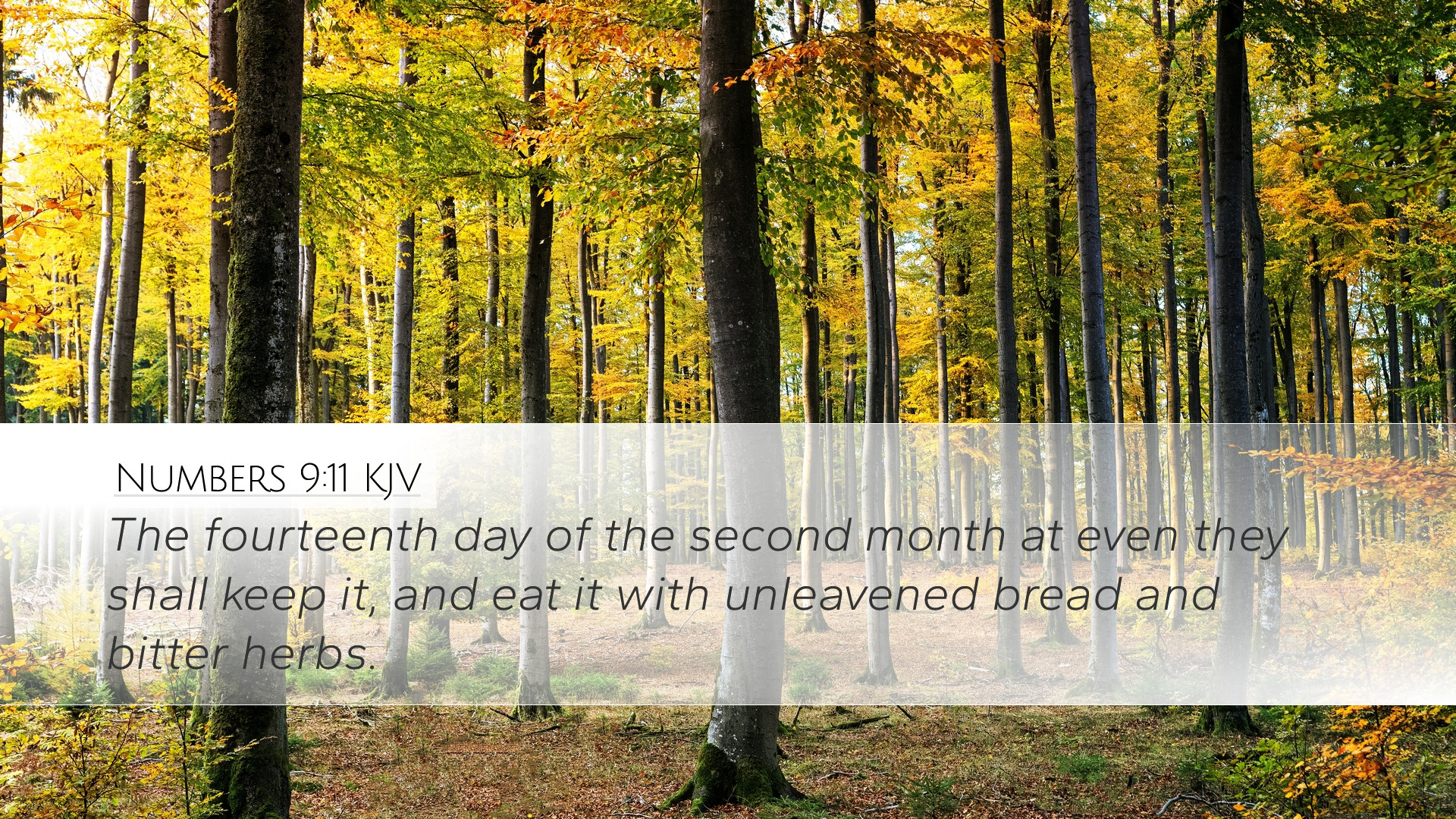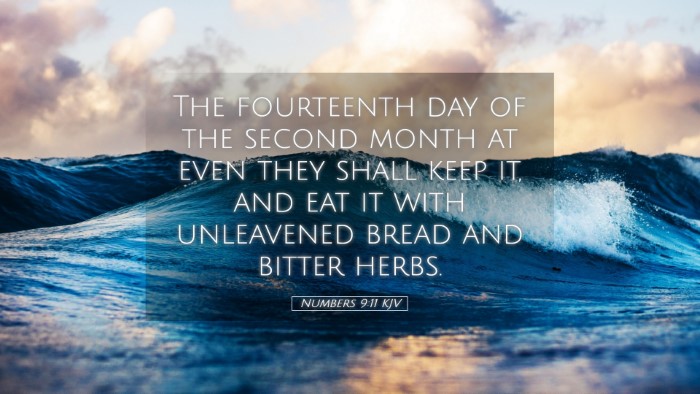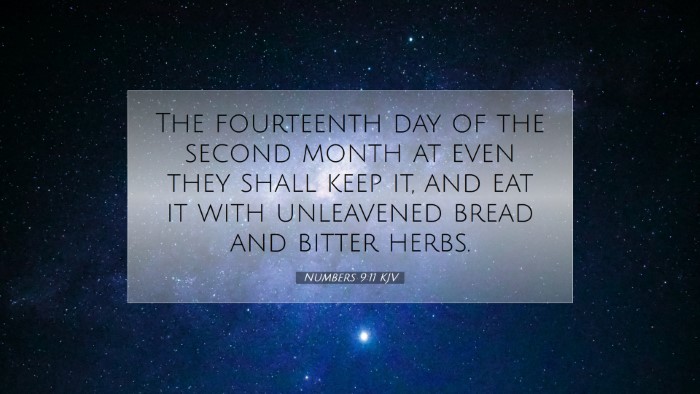Commentary on Numbers 9:11
Bible Verse: Numbers 9:11 - "In the fourteenth day of the second month at even, they shall keep it, and eat it with unleavened bread and bitter herbs."
Introduction
This verse is part of a significant passage detailing the observance of the Passover, a crucial event in the history of Israel. It encapsulates the prescribed instructions for the celebration of this festival, emphasizing both communal and individual aspects of worship.
Historical Context
The book of Numbers recounts the journey of the Israelites in the wilderness. After their exodus from Egypt, God established several ordinances to create a distinct identity for His people. The Passover serves as a foundational event that commemorates their deliverance from slavery and marks the beginning of their covenant relationship with God.
Exegetical Insights
As we explore Numbers 9:11, it is essential to recognize several key elements:
- The Timing: "In the fourteenth day of the second month" indicates a specific time frame that showcases God's sovereignty over the seasons and the calendar. The directive emphasizes the importance of following God's timing in worship.
- The Significance of Evening: The phrase "at even" reminds us of the transition from light to darkness, symbolizing the shift from bondage to freedom. This timing also aligns with the tradition of slaughtering the Passover lamb at dusk, signifying the sacrificial nature of the festival.
- The Symbolism of Unleavened Bread: "They shall eat it with unleavened bread" underscores the necessity of purity and holiness before God. Leaven often symbolizes sin in Scripture, and consuming unleavened bread reflects the believers' need for spiritual cleansing.
- Bitter Herbs: "And bitter herbs" serve to remind the people of their affliction in Egypt. The consumption of bitter herbs is an act of remembrance, fostering gratitude for God's deliverance. It also emphasizes the reality of suffering in the life of faith.
Theological Implications
This verse and the associated practices have profound theological implications for pastors, students, and theologians:
- Covenant Relationship: The Passover profoundly illustrates God's covenantal faithfulness. As the Israelites participate in this meal, they engage in a divine reminder of the promises made to Abraham, Isaac, and Jacob.
- Christological Foreshadowing: The Passover lamb, slaughtered and eaten, serves as a prophetic foreshadowing of Christ, the ultimate sacrificial Lamb whose blood redeems believers from the bondage of sin.
- Community and Participation: The communal nature of the Passover meal emphasizes the importance of shared faith among God's people. It invites reflection on the church's role in fostering community and remembrance in worship.
- Memorial Act: The elements of the Passover meal evoke a dual sense of grief and joy—acknowledging Israel's suffering while celebrating their liberation. This embodies the Christian experience of lament and hope.
Commentary Insights
The insights from renowned commentators enrich our understanding of this passage:
Matthew Henry
Matthew Henry emphasizes the structured nature of the divine commands given at this time. He notes that God desires order in worship, which speaks to the larger principle of the need for reverence when approaching sacred practices. Henry also highlights the historical context of bitterness as a reminder of past suffering, suggesting it serves as a framework for understanding God's redemptive work.
Albert Barnes
Albert Barnes provides a detailed examination of the ritual associated with the Passover. He notes that this command in Numbers illustrates God's attention to detail and the importance of obedience to His laws. Barnes points out that the bitter herbs symbolize the hard service of Israel while emphasizing that recognition of past trials is essential in appreciating the fullness of God's salvation.
Adam Clarke
Adam Clarke's commentary delves deeply into the symbolism of the Passover elements. He articulates that the unleavened bread represents the haste of their departure from Egypt, while the bitter herbs serve as a sensory reminder. Clarke elegantly ties these elements back to their spiritual significance, inviting believers to consistently reflect on their own deliverance from sin.
Practical Applications
For contemporary pastors and theologians, Numbers 9:11 inspires several practical applications:
- Worship Structure: Encourage congregations to recognize the importance of structure in worship, allowing for the systematic observance of sacred practices that deepen faith.
- Remembrance as a Spiritual Discipline: Foster habits of remembrance within church communities, promoting practices that encourage reflection on God’s faithfulness.
- Community Engagement: Emphasize the significance of communal meals and gatherings that echo the Passover, creating spaces for shared experiences of God's grace.
- Teaching Moment: Use the elements of the Passover meal in teaching moments, drawing parallels between Old Testament observances and New Testament revelations of Christ.
Conclusion
Numbers 9:11 offers a wealth of insights crucial for understanding the importance of the Passover in both the Old Testament narrative and its significance for contemporary faith. Through historical context, theological reflection, and commentary insights, we see a picture of God's covenantal love and the continuing call for holiness and remembrance in the lives of His people. As we meditate on this verse, may it inspire a deeper commitment to valuing sacred moments in our journey of faith.


